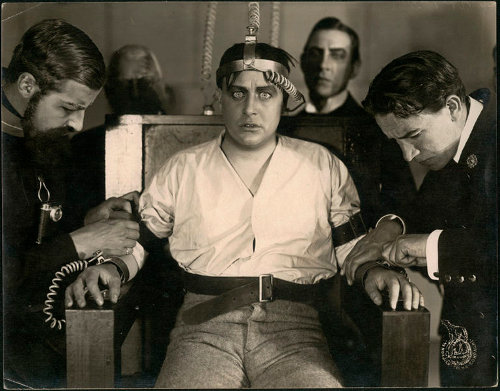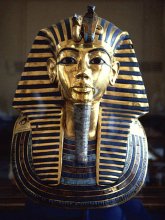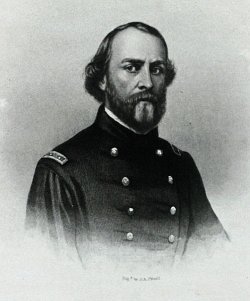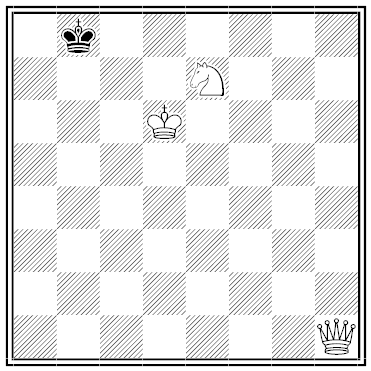A bag contains 16 billiard balls, some white and some black. You draw two balls at the same time. It is equally likely that the two will be the same color as different colors. What is the proportion of colors within the bag?
Exit Lines

Last words of executed criminals:
- “Mercy! Mercy! Mercy! Don’t hang me! I can’t die! I’m not ready to die! I don’t want to die!” — North Carolina burglar Henry F. Andrews, 1879
- “Where is my little boy? Look at me, my son, and take warning.” — Louisiana murderer Edward Rector, 1884
- “What time is it? I wish you’d hurry up. I want to get to hell in time for dinner.” — Wyoming murderer John Owens, 1886
- “These are for my sister [taking off her eyeglasses]. Please see that she gets them.” — Vermont murderer Mary Mabel Rogers, 1905
- “They can’t kill a smile!” — Montana murderer Harrison Gibson, smiling, 1917
- “I have something of interest to tell –” — California murderer Paul Rowland, cut off by his hanging, 1929
- “Make it snappy.” — California murderer Charles H. Simpson, 1931
- “You might get me a gas mask.” — Arizona murderer Jack Sullivan, 1936
- “So long.” — Utah robber and murderer James Joseph Roedl, 1945
- “Kiss my ass.” — John Wayne Gacy, to a prison guard, 1994
- “Merry Christmas.” — Virginia rapist and murderer Lem Tuggle, 1996
Before his lethal injection in 2007, Arizona murderer Robert Comer said, “Go Raiders.”
That Kind of Woman

“What a subject: her nose is too big, her mouth is too big, she has the composites of all the wrong things, but put them all together and pow! All the natural mistakes of beauty fall together to create a magnificent accident.” — Rex Reed on Sophia Loren, review, Oct. 23, 1968
Black and White
An Atheist’s Credo
George P. Spencer of Lyndon Center, Vt., died in 1908 at age 83. His epitaph is inscribed on the sides of a granite monument:
Beyond the universe there is nothing and within the universe the supernatural does not and cannot exist. Of all deceivers who have plagued mankind, none are so deeply ruinous to human happiness as those impostors who pretend to lead by a light above nature. Science has never killed or persecuted a single person for doubting or denying its teachings, and most of these teachings have been true; but religion has murdered millions for doubting or denying her dogmas, and most of these dogmas have been false.
(From Charles L. Wallis, Stories on Stone, 1954)
Tut-Tut

In 1982, San Francisco police lieutenant George LaBrash suffered a stroke while guarding the 3,300-year-old mask of King Tutankhamun. He filed an $18,400 lawsuit against the city, alleging that the pharaoh’s curse had struck him for disturbing the dead — and hence that the injury was job-related.
“I firmly believe that King Tut’s curse is as good an explanation for what happened to me as any,” he told Superior Court Judge Richard P. Figone.
Figone didn’t buy it. “The spectators who attended the exhibit may just as well have ‘disturbed’ the remains of the deceased,” he wrote. “Officer LaBrash, if anything, prevented desecration of those remains.”
In a Word
akrasia
n. weakness of will
“I see and praise what is better, but follow what is worse.” — Ovid
A Letter Home

Excerpt from a letter from U.S. Army major Sullivan Ballou to his wife, July 14, 1861:
The indications are very strong that we shall move in a few days — perhaps tomorrow. Lest I should not be able to write you again, I feel impelled to write lines that may fall under your eye when I shall be no more. …
Forgive my many faults, and the many pains I have caused you. How thoughtless and foolish I have often been! How gladly would I wash out with my tears every little spot upon your happiness, and struggle with all the misfortune of this world, to shield you and my children from harm. But I cannot. I must watch you from the spirit land and hover near you, while you buffet the storms with your precious little freight, and wait with sad patience till we meet to part no more.
But, O Sarah! If the dead can come back to this earth and flit unseen around those they loved, I shall always be near you; in the brightest day and in the darkest night — amidst your happiest scenes and gloomiest hours — always, always; and if there be a soft breeze upon your cheek, it shall be my breath; or the cool air fans your throbbing temple, it shall be my spirit passing by.
Sarah, do not mourn me dead; think I am gone and wait for me, for we shall meet again.
He never sent it. It was found in his trunk after he was killed in the First Battle of Bull Run.
Vision Thing
A puzzle from Lewis Carroll:
A king wishes to dismiss his wise men, but he must obey an old law that says there must always be:
Seven blind of both eyes,
Ten blind of one eye,
Five that see with both eyes,
Nine that see with one eye.
How many wise men must he keep?
Bird Love
I, along with several onlookers, says a friend, recently, observed a swallow enter an exhaust-pipe in the roof of one of the Grand Trunk workshops, evidently for the purpose of building her nest in it. Unfortunately for her, she could not get out again; and her partner entered the pipe also, and backed out again with a feather in his beak. Three times did he ineffectually attempt to rescue his mate. When work was resumed in the afternoon, the swallow was blown out of the pipe by the steam, and lay dead on the roof of the building, the survivor standing by and showing signs of deep distress.
— James Baird McClure, ed., Entertaining Anecdotes From Every Available Source, 1879
The following is related by an eminent naturalist: ‘A young lady was sitting in a room adjoining a poultry yard, where chickens, ducks and geese were disporting themselves. A drake came in, approached the lady, seized the bottom of her dress with his beak, and pulled it vigorously. Feeling startled, she repulsed him with her hand. The bird still persisted. Somewhat astonished, she paid some attention to this unaccountable pantomime, and discovered that the drake wished to drag her out of doors. She got up, and he waddled out quietly before her. More and more surprised, she followed him, and he conducted her to the side of a pond where she perceived a duck with its head caught in the opening of a sluice. She hastened to release the poor creature and restored it to the drake, who by loud quackings and beating of his wings testified his joy at the deliverance of his companion.’
— Ballou’s Monthly Magazine, May 1870

